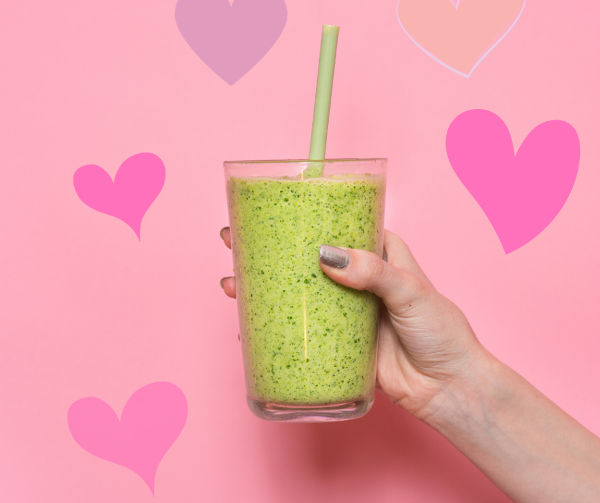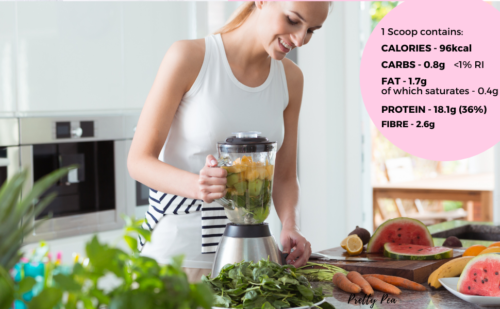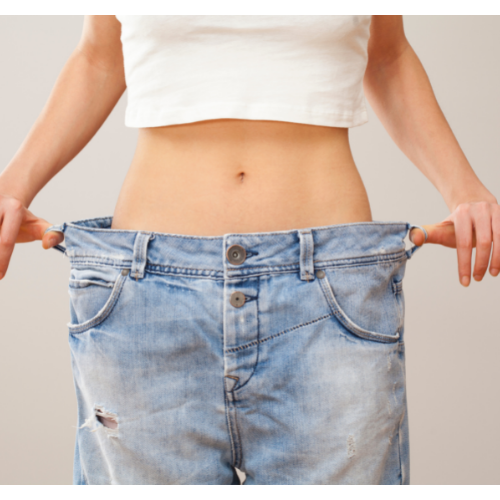Your basket is currently empty!
How Much Protein Do Women Need

Protein benefits
Women more than ever are focusing on the power of protein in their everyday diet and for good reason.
So why are women supplementing with protein powder and how much protein do women need? Protein is a vital macronutrient that’s involved in almost every bodily function or process. It’s more than just muscle food. Protein plays a key role in building and repairing tissues including your skin and muscle fibres. Protein is also involved in the production of hormones and enzymes.
It’s an all round essential for you to look good and feel good and be in hormonal balance.
So how exactly does protein help women achieve their body goals? This article explains how much protein women really need and why, especially when it comes weight loss and body composition goals.
How much protein do women need?
There’s conflicting advice everywhere you turn so let’s keep it simple and factual.
The protein DRI (Dietary Reference Intake) for the average sedentary women for is 0.36 grams of protein per pound of bodyweight.
Or in kilograms that’s 0.8g per kg of bodyweight.
Example: A woman weighing 75kg should consume a minimum of 60g of protein each day. This should ideally be consumed over 3 meals a day, so in this example would be 20g at each meal.
Bear in mind that the recommended nutritional guidelines are based on the average sedentary person. The precise amount of protein for any individual will vary and is dependent on factors including age, activity levels, muscle mass, body goals and current state of health. Remember you are unique.
Also guidelines are often established minimums to prevent deficiency or disease – which bluntly means an amount sufficient for the body to survive, not always necessarily the optimum amount for YOUR body to thrive.
Now calculate if you’re getting enough protein each day? If weight loss is your goal you need more. Much more.
If weight loss is your goal then this number increases to 0.7 grams to 1 gram per pound of bodyweight.
Per kilogram that’s between 1.6 grams – 2,2 grams per kg of bodyweight. (Even more again for athletes and those exercising heavily).
Example: A woman weighing 150 pounds (around 10st 7lb) should be consuming 105 – 150 grams of protein daily where weight loss is the goal.
Example: A woman weighing 200 pounds (around 14st 3lb) would require 140-200 grams for optimum weight loss.

Protein builds muscle
Protein is probably most commonly known as being the fuel for muscle growth (in both men and women). Because muscle is itself largely made up of protein.
So why is muscle important for weight loss ? Well If you think of muscle mass as being the body’s engine room, muscle being the metabolic tissue that burns energy, aka calories. So the more muscle mass someone has the more energy the body needs to fuel this metabolically active tissue. This means the body is burning more calories around the clock every day of the week – even when asleep.
With age our body’s muscle mass starts to declines, which in turn means a drop in our basal metabolic rate.
Less muscle mass means the body requires less energy
This decrease in muscle and metabolic rate is a gradual process. After age 30 we start to lose as much as 3-5% per decade. This is compounded with the addition of some dramatic hormonal changes affecting women usually in their 40’s and this invariably can be the start of the ‘middle age spread’ for many women.
So if you want to simply maintain your metabolism you have to maintain your muscle mass.
If you want to increase your metabolism your goal is to increase your muscle mass.
This is so fundamental and probably my biggest key message to any woman, especially over 40, who wants to avoid the middle age spread from spreading. Because shifting hormones means any fat storage is now going straight to your stomach after 40.
When it comes to weight loss an increase in protein can also help preserve muscle loss associated with low calorie diets. Protein helps the body preserve lean body mass during calorie restriction. The body will use both body fat and muscle mass for energy during calorie restriction, so whilst you lose weight you’re also likely losing muscle mass also.
It’s important to preserve the all important muscle that’s going to keep your metabolism revved up long after the calorie restricted diet has ended.
Protein keeps you full
We know weight loss is about calories in -v- calories out, well studies suggest that eating protein can help this energy balance by reducing the amount of calories going in AND by increasing the number of calories going out.
The reduction in number of calories going in is achieved by a reduction in appetite. Whilst the number of calories going out is boosted by a boost in metabolism. Win win.
Protein’s power’s have been extensively researched and the evidence confirms that high-protein diets can increase energy expenditure. It’s been shown that a diet compromising 25–30% of total daily calories from protein can boost metabolism by up to 80–100 calories per day. 100 calories each day all adds up.
However, protein’s more significant contribution to weight loss is it’s appetite quenching powers, with its ability to help reduce appetite (and curb those cravings).
A reduced appetite = reduced calorie intake
High Protein diets are proven to be more satiating and better than fat or carbs at keeping you feeling full.
In one particular study, the obese participants consumed 25% of their daily calories from protein and reported increased feelings of fullness, reduced desire for late-night snacks and their food-obsessive thoughts reduced by 50%.
Protein can mean eating 441 fewer calories each day. A study of women who increased their protein intake to 30% of their daily calories ate 441 less calories per day. They also lost 11 pounds by doing so (over the 12 week study).
And it’s not just weight loss where protein has it’s benefits – it can prevent weight re-gain too. A study where the participants made a modest protein increase from 15% to 18% of calories, reduced the amount of body fat they regained after weight loss by 50%.

Protein is harder to store as body fat
Your body process each macronutrient (protein, fat, carbs) differently. This in turn affects how much of each is stored as body fat.
Essentially, in order for protein to be stored as body fat it goes through a different biochemical process than the other macronutrients do which makes it much harder for your body to store protein as body fat.
One study found that fats were stored at 96% efficiency, carbohydrates with 80% efficiency and protein stored at around 66% efficiency.
Protein is thermogenic
If all this wasn’t enough, protein also has added benefit of being the most thermogenic of your macronutrient food groups. This means your body uses more energy (calories) during the digestion process than it does compared to when consuming fats and carbs.
It’s known as the ‘cost’ of digesting your food as essentially your body has to use energy to break down food, then digest it before turning it into energy.
This thermic effect of food (TEF) has a relatively small impact on overall daily energy expenditure (and weight loss), but if you’re counting calories it’s far from meaningless. Look at it as the icing on cake.
Can you eat too much protein
It get’s banded about that a high protein diet can cause kidney damage but there is no evidence no state that protein can cause kidney damage in healthy people. For those with pre-existing kidney issues then protein restriction may be helpful.
Similarly it’s been claimed that excessive protein may lead to osteoporosis, however, the evidence shows that protein may indeed prevent osteoporosis.
Note, when calculating your daily protein remember that the grams of protein contained in your food won’t be the same as the total amount of grams the food weighs. Your food will likely be made up of several macronutrients – not just protein.
For example a large egg may weigh 40 grams, but it’s protein content is 6 grams. This is where a scoop of protein powder makes it really simple – no calculator needed.
Are you getting enough protein?
So now you know just how important protein is to maintaining a healthy body composition ask yourself are you getting enough?
In short, consuming more protein makes it much easier to stick to any weight loss diet — be it high carb, low carb, or something in between. Protein is going to help you achieve your goals faster and protein is going to help you maintain your results.
Understanding the power of protein is important – because knowledge is power. The more benefits you know about what you’re eating ultimately makes it so much easier for you (and your brain) to make informed choices.
Pretty Pea protein powder offers an easy way to add protein to your diet and reap all these benefits. And for the next time you have pizza: A study found that 20 grams of pea protein powder taken 30 minutes before eating pizza reduced the average number of calories consumed by roughly 12%.

Related Articles: Read more on appetite suppressants
[/et_pb_text][/et_pb_column] [/et_pb_row] [/et_pb_section]
2 responses to “How Much Protein Do Women Need”
[…] For high protein foods think free range chicken and turkey breast and fish. Dairy foods such as milk, cheese, Greek yoghurt, cottage cheese, eggs are all high in protein. In addition, you can of course supplement with protein powder. See more on the benefits of pea protein. […]
[…] to smoothies. Supplementing can make it much easier to follow a menopause diet. Always opt for a high quality protein powder such as Pretty Pea […]